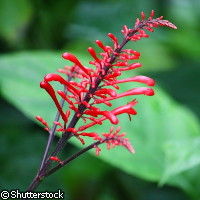Plant diversity fears grow as global warming continues
Global warming will continue to play havoc on our planet in the years to come, affecting diverse species as they encounter myriad changes, new research shows. German and US researchers warn that the living conditions for plants in particular will change significantly. Their work, presented in the Proceedings of the Royal Society London quantifies and models on a regional basis the potential impact of climate change on our world's plant diversity. The researchers from the University of Bonn in Germany, along with their colleagues at Yale University in the US, evaluated plant species that are found in different regions under existing climatic conditions. They applied the subsequent interrelationships they found to 18 different climate change scenarios for the year 2100. 'Climate change could bring great confusion to the existing pattern of plant diversity, with scarcely predictable consequences for our ecosystems and mankind,' explained lead author Dr Jan Henning Sommer from the Nees Institute for Biodiversity of Plants at the University of Bonn. The study's findings highlight how the Earth's cool, moist regions could provide refuge for more species, but also how dry and hot regions could become hostile to plant diversity. The team, however, cannot offer predictions on how the biodiversity of any given region will adapt to the new conditions. Specifically, they cannot determine whether new species will move into ideal or more favourable regions or whether less advantageous regions will experience a major loss in species numbers. 'That would be fortune-telling,' Dr Sommer remarks. 'The adaptability of species and their interactions in the ecosystem can, like human land use, exert great influence on their distribution. This is a field about which we still know far too little.' Despite not being able to make detailed predictions, the researchers say their data offers the world hints as to the scales of species immigration or losses that some areas may sustain. Their research also suggests that the tropical Amazonian rain forests in South America will probably experience the biggest loss in plant species because of global warming, but that Germany and other temperate regions across the globe will probably become much-favoured areas for additional species. 'But this can scarcely be described as a gain, as the intensified redistribution of plant species will promote worldwide uniformity in the regional composition of species at the expense of unique species which have adapted to special habitat conditions,' Dr Sommer pointed out. The study also spotlights an obvious split of our planet into two parts, vis-à-vis how climate change is affecting plant diversity. Co-author Professor Holger Kreft, from Göttingen University in Germany, said: 'Additional capacity for plants species richness could be created everywhere where today cool and moist climatic conditions prevail. On the other hand, in areas which today have a hot tropical or sub-tropical climate the prerequisites for high species numbers will deteriorate.' From a political perspective, the researchers note how a strong climate policy is needed. Co-author Professor Wilhelm Barthlott of the Nees Institute concluded: 'Politicians throughout the world should be paying greater attention to the impact of climate change on biodiversity as this is the basis of our human existence.'
Countries
Germany, United States



